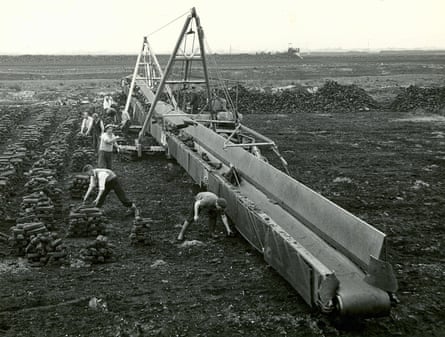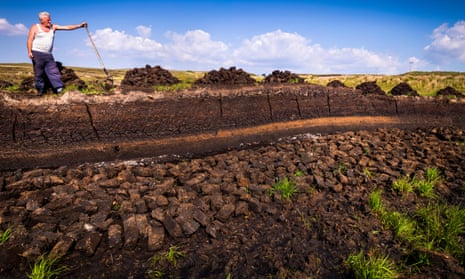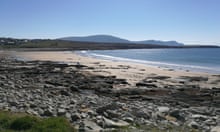When the semi-state company that harvests Ireland’s peatlands recently announced the closure of 17 bogs, the news was greeted as the end of an era. Turning the soggy landscape that covers much of Ireland’s midlands into a fuel source had been a great national project, an ambitious undertaking launched by the republic’s founding fathers in the 1930s. Draining and cutting hundreds of thousands of hectares of turf on an industrial scale generated desperately needed jobs and reduced dependence on oil imports for almost a century.
So there was some nostalgia last month when Bord na Móna, the peat-harvesting company, announced it was closing 17 of its “active bogs” and would close the remaining 45 within seven years. Nostalgia but also acceptance, given the growing awareness that harvesting peat emits greenhouse gases that worsen climate change, requiring a shift to renewable energy. “Decarbonisation is the biggest challenge facing this planet,” said Tom Donnellan, the company’s chief executive.
The announcement followed promises by the taoiseach, Leo Varadkar, to make Ireland a global leader in protecting the planet, backed by a €22bn (£19.5bn) government plan for climate action. A progressive force on social issues, Ireland would also become a beacon for the environment.
The problem, according to environmentalists and academics, is that it is all hot air. Renouncing bog harvesting, they say, is too little, too late – a false solace because the ravaged peatlands will continue to emit greenhouse gases. And the government’s climate leadership pledge, they say, does not cancel out a dismal environmental record that has left Ireland potentially facing up to €600m in fines for missing emissions targets.
John Sweeney, a climate expert and geography professor at Maynooth University, said: “Climate change requires long-term thinking but the political cycle is much shorter and that of economically vested interest groups is shorter still.”
Peatlands, formed by the accumulation of decayed vegetation, help regulate the climate by removing carbon dioxide from the atmosphere and storing carbon within the peat. As fuel, it is more damaging than coal, generating less energy when burned while producing higher carbon emissions. Depending on how it is calculated, the peat industry contributes between 3m and 6m of the 62m tonnes of greenhouse gases that Ireland emits each year.

Bord na Móna appears to be morphing from climate villain to climate champion. Its annual peat harvest is forecast to tumble: from 3m tonnes in 2015 to an estimated 2m in 2020 and less than 1m by 2025. Its power plant in Edenderry, County Offaly, still burns peat, but relies increasingly on biomass. During the 2017-18 financial year renewable energy, including wind and solar, accounted for more than 60% of the company’s power generation.
Pat Sammon, a spokesman at the company’s headquarters in Newbridge, County Kildare, on the edge of the 370 sq miles of the Bog of Allen, said: “We’re heading to a new era because the main business of the company had been extracting peat and that’s falling away now.”
But environmental experts are unimpressed. “It’s a bit of a smokescreen. It’s all revenue-driven,” said Florence Renou-Wilson, a research scientist and peatland expert at University College Dublin. Bord na Móna was closing bogs that were exhausted and no longer profitable, she said. “They’re all done and dusted.”
The company was seeking new markets for peat in horticulture, she said, and, worse, it seldom “re-wet” used bogs, so the ravaged land continued to emit greenhouse gases. “They’ve just been leaving them abandoned.”
Harvested peatlands – Bord na Móna’s as well as those developed by private operators – produce about 2.6m tonnes of “fugitive” emissions a year. Rehabilitation could make many of the bogs carbon neutral or even carbon sinks. Catherine O’Connell, the head of the Irish Peatland Conservation Council, said Bord na Móna’s decarbonisation talk was spin. “It’s genius what they’ve done. They’ve come out of this looking green. But they’re miners – they remove the living surface of the bog and dig down. Death by a thousand cuts.”
As an environmental policy goal, ending the cutting and burning of peat should have been “low-hanging fruit”, said Tony Lowes, the director of the group Friends of the Irish Environment. “But we have struggled to truly bring it under control because of its emotional attachment and cultural heritage.”
Environmentalists say this fits a pattern of state authorities ducking climate commitments. Ireland emits 13 tonnes of greenhouse gases per person a year, the third-highest level in the EU. The UK emits eight tonnes per person.
Under EU commitments, by 2020 Ireland is supposed to cut emissions by 20% from 1990 levels. The target for 2030 is 40%. Ireland is on track to exceed the first target by 16m tonnes and the latter by 50m tonnes, triggering fines estimated to range from €230m to €600m.
Last month, David Boyd, a UN special rapporteur on human rights, said Dublin’s failure to tackle climate change breached human rights. He made the comments in a legal submission to support a court case brought by Friends of the Irish Environment, accusing the government of “knowingly contributing to dangerous levels of climate change”.
Earlier this year, Varadkar raised expectations of a rise in carbon tax, widely seen as a basic, vital step to curbing emissions. But last month’s budget left it unchanged at €20 a tonne.
Critics said the government flunked climate commitments for fear of a voter backlash, a pattern set when it backed a dramatic surge in dairy and beef farming, pleasing rural voters and business interests but derailing emission goals.
Richard Bruton, the minister for climate action and environment, acknowledged last week that Ireland was “far off course” and announced a plan to make every department responsive to climate change.
This article was amended on 27 November 2018 because an earlier version mistakenly said the power plant in Edenderry no longer burns peat. This has been corrected.









